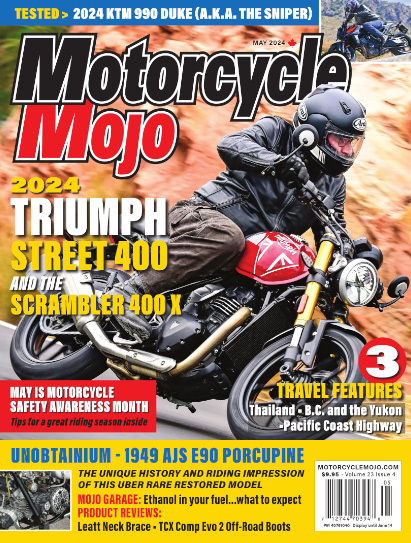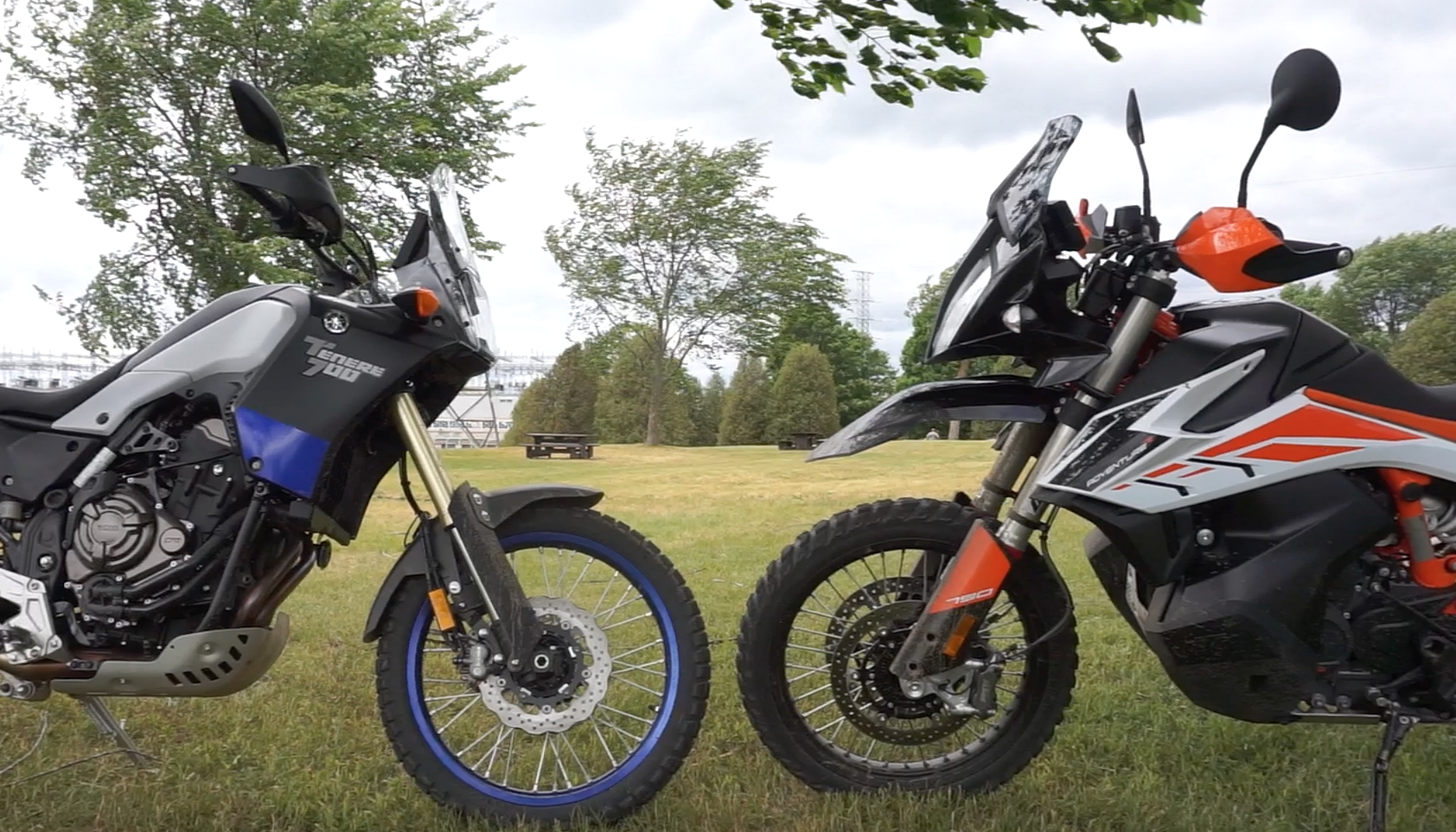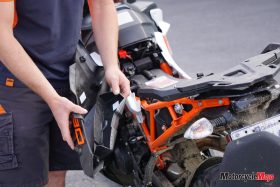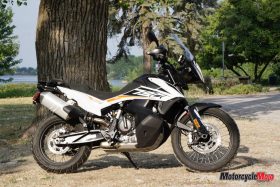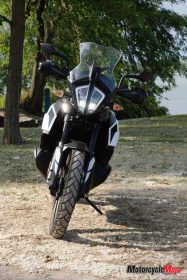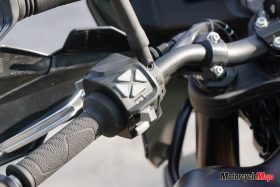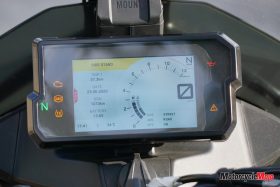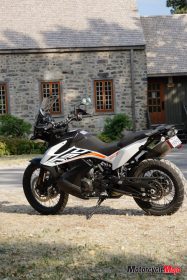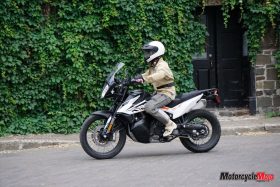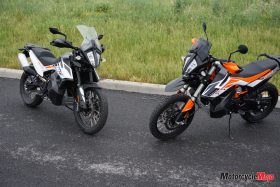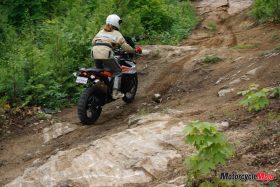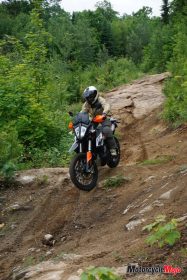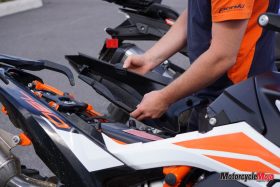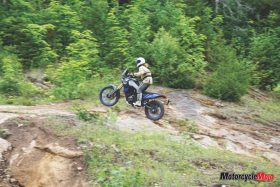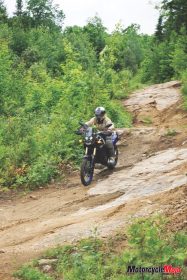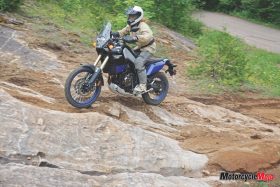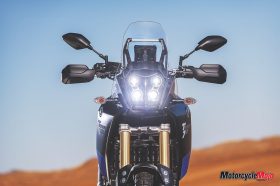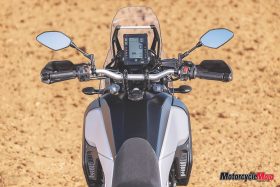Both KTM and Yamaha offer very competent midsize adventure machines, albeit using different levels of technology.
I know that the children’s tale is called “The Tortoise and the Hare” but, for some reason, “the rabbit and the hare” just rolled off my tongue better. Not to mention this analogy works well for the comparison of Yamaha’s Ténéré 700 and KTM’s 790 Adventure and Adventure R. Both companies created similar creatures to achieve the same purpose – to the untrained eye, they may even seem to be the same species. However, you may wonder if one is better than the other. Could a rabbit beat a hare? Or is a hare born to leave a rabbit in the dust?
The Yamaha Ténéré 700 and the KTM 790 Adventure and Adventure R were the most highly anticipated midsize adventure bikes within the motorcycle manufacturing industry for the past three years. This category of bikes attracts a large segment of the consumer market, and for good reasons: they are lightweight, and embody performance and style while sitting at a reasonable price point.
If you were to take a critical look at the specs of each bike, you’d notice that these bikes aren’t closely comparable, as they offer completely different assets for the rider, a different niche style of riding and different price points. But things aren’t always so simple; when multiple factors come into play, deciding if one machine is superior to the other is a muddle. So, that begs the question: which one is better?
Ténéré 700
I recently wrote a review about the Yamaha Ténéré 700 (Motorcycle Mojo, Sept/Oct 2020), and I thoroughly enjoyed the bike. Riding a lightweight bike with full adventure capability without the electronic options to distract me from the ride at hand was refreshing. The T7 is capable, without a doubt, but does lack some high-performance components that a serious rider would consider upgrading at purchase. Of course, that was Yamaha’s goal: create something versatile for any skill level and every rider on a budget who is looking for a new bike.
With the Kawasaki KLR650 no longer in production, Yamaha opened up a relatively untouched segment of the adventure market. And with most manufactures looking to boost horsepower, and tech, Yamaha cleverly offered something that we were all missing: a simple, capable and affordable rally-styled adventure-class bike. On top of that, Yamaha’s smart marketing and “early deposit” promotion heightened the hype for this machine.
Keeping your excitement in check is hard when riding the T7, a bare-bones style bike that handles competently off-road. These days, we riders are prone to desiring bikes decked out with electronics. But when did we decide we needed all of this? Throughout the years, we did just fine on bikes that had no additional controls and electronics. Did we ever say that we needed more electronics to ride our bikes to the places we love? Or did the manufacturers determine this?
KTM 790 Adventure R
When I ride, people often comment on how small I am. My reply: “I’m not small; I’m compact.” My words rang through my head as I rode The KTM 790 Adventure R through mud, over rocky trails, on gravel back roads and on sweeping tarmac back into the city. KTM finally offered something that not many manufacturers did: an incredibly capable machine with a robust engine and high-end components, all bundled in a compact adventure machine.
Readers may remember Costa Mouzouris’ review of the 790 Adventure R in our November 2019 issue (“Taking Midsize Adventure Seriously”), in which he stated, “I didn’t take long after hitting the dirt to realize that the Adventure R is just about the best adventure bike I’ve ridden to date.”
Those are big words coming from such a prolific writer.
KTM 790 Adventure
The 790 Adventure, a slightly smaller sibling to the Adventure R model, creates a more affordable package ideal for riders looking to get into the adventure category or with a humble ego that reminds them they may not need all the upgrades that the Adventure R model offers. The smaller Adventure, which lacks the Rally Pro mode found on the R and has slightly fewer suspension features and a lower seat than its larger sibling, is a great all ’round bike that’s more suitable for a wider range of riders. The Adventure is one of my favourite bikes from KTM; it’s comfortable for riders of any size, still offers the capability of the R, is more affordable and has less aggressive tires.
Suspension
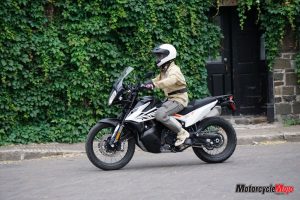 The 790 Adventure R rules the competition in its category, with its fully adjustable front and rear WP suspension that offers 240 mm of travel on both ends, creating a plush and responsive ride through varied terrain. Using the dials on the top of the forks to change compression and rebound damping is easy enough once you hit the pavement again.
The 790 Adventure R rules the competition in its category, with its fully adjustable front and rear WP suspension that offers 240 mm of travel on both ends, creating a plush and responsive ride through varied terrain. Using the dials on the top of the forks to change compression and rebound damping is easy enough once you hit the pavement again.
The 790 Adventure model offers a non-adjustable fork and a preload adjustable rear shock, and both ends offer 200 mm of travel. The suspension still offers a versatile ride for riders of any skill level and weight, although the suspension does reveal one of the features of the bike that enabled KTM to save on the price of the machine.
The Ténéré 700, for its part, has a fully adjustable inverted front fork with 210 mm travel and the rear suspension is also fully adjustable with 200 mm travel. However, you are likely to find yourself doing some adjustment after your first ride, given that the suspension feels stiff at highway speeds and harsh while riding slowly on technical terrain. Still, the T7 is compliant at moderate speeds on gravel roads and light trails.
Handling and Ergonomics
The KTM 790 Adventure offers a well-rounded package with the same engine as the 790 Duke but with more streetworthy tires and a taller windscreen than the Adventure R has. Ripping around corners and cranking the throttle out of the apex of turns feels intuitive on the Adventure. That bike’s slightly less ground clearance than the taller 790 Adventure R’s enhances on-road handling versus the R.
The R is comfortable on any terrain and even with adventure-type tires, the bike felt sporty through weaving roads. However, it has a short windscreen that offers little protection when riding long distances.
The T7 is bearable to ride on the highway, but not fun for long distances. The suspension feels rigid at high speeds, and the windscreen offers a narrow area for wind protection. The narrow seat didn’t give my sit bones much plush comfort, although the T7’s engine (the same as the one in the MT-07) offers reliable and responsive power that won’t intimidate.
Off-Road
Off-road is where the head-to-head competition between the T7 and the KTM 790 Adventure models begins. Riding these three bikes consecutively to see how differently each bike’s chassis and dynamics perform during most facets of riding was an interesting experience.
The Ténéré 700 offers a slim dirt bike’s nimbleness while riding – Yamaha obviously focused on its off-road capabilities when designing the machine. Feeling comfortable heading into numerous lines while riding was incredibly easy, given the T7’s “point and shoot” agility. Growing up riding Yamaha dirt bikes, I had a sense of déjà vu when I sat on the T7 for the first time; it felt like a distant cousin to Yamaha’s WR250F.
The Ténéré 700 shines when I stood on the pegs – upright handlebar position encourages a rider to maintain strong posture but offers a good pocket for your knees to hug the bike and “weight” the pegs when needed. However, the T7 exposes its top-heavy weight when I attempted to perform slow tight turns. And when I dropped the bike, this weight made picking up the T7 a cumbersome process. I tend to have a hard time picking up adventure bikes when I lay them down and crush my pride.
The 790 Adventure and Adventure R offer a confidence-building platform for any rider, especially smaller ones. The very robust, low-slung gas tank drops down on each side – acting as an engine guard – and offers a low centre of gravity while keeping the midsection of the bike especially thin.
Some Are Easier Than Others
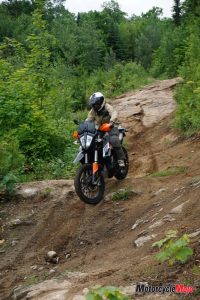 I often say that I have an easier time picking up a BMW R1250GS compared with most other bikes because of the angle at which it comes to rest, thanks to the boxer engine. It acts as a third point of contact to the ground, allowing the bike to be almost halfway upright by the time the tires bear the weight of the bike. KTM’s gas tank(s) provides a similar pivot point, easing riders’ struggle when picking up the bike. With the tank resting on the ground, you can easily lift the bike about a third of the way up before the bike’s weight begins to transfer to the tires.
I often say that I have an easier time picking up a BMW R1250GS compared with most other bikes because of the angle at which it comes to rest, thanks to the boxer engine. It acts as a third point of contact to the ground, allowing the bike to be almost halfway upright by the time the tires bear the weight of the bike. KTM’s gas tank(s) provides a similar pivot point, easing riders’ struggle when picking up the bike. With the tank resting on the ground, you can easily lift the bike about a third of the way up before the bike’s weight begins to transfer to the tires.
Another contributing factor to handling a motorcycle is the height from the foot peg to the lowest section of the seat. For our test bikes, this measurement was close: the T7’s is 527 mm while the 790 R’s is 514 mm. The KTM’s slightly shorter length meant that I could separate my body that much more from the bike, making it more nimble in tight sections and allowing the seat to fit snugly between my knees. A taller rider may not notice such a small difference, but for a vertically challenged rider, every millimetre counts.
The Ténéré 700’s and the 790 Adventure R’s seat heights are similar: the T7’s is 875 mm; the 790 R’s is 880 mm.
Without looking at the specs, I would guess that the 790 R was lower – due in part to its low-slung tank, which creates an exceptionally slim midsection and drops the weight to feel stable when the bike is standing still. Both the T7 and the Adventure R models offer optional lowered seats. The Ténéré 700’s can be dropped to 835 mm. On the other hand, the 790 Adventure R’s optional lowered seat drops its height to 855 mm, or by adding the Adventure model seat drops it to 830/850 mm.
The 790 Adventure’s adjustable stock seat offers two heights: 830 or 850 mm.
Electronics
This is where the three bikes are completely set apart, attracting riders for completely different reasons. The 790 Adventure models boast advanced electronic features; the T7 appeals to more minimalist riders who are tired of inescapable gadgets imposed on us.
The 790 Adventure R offers a full TFT display, with ABS, traction control, throttle slip adjustment (in Rally mode), along with four ride modes – Street, Rain, Off-road and Rally. Rally mode is quite advanced for many riders, and I found that Off-road mode is the most user-friendly. The 790 Adventure offers the same electronics package, except without Rally mode. Although I found the menus easy enough to get through most of the time, doing so was difficult at times.
The Ténéré 700 sits at the other end of the gadget spectrum, with a basic digital screen with three buttons to filter through the menu and turn off the ABS – doesn’t get much simpler. Riding a bike without a distracting electronics display that nevertheless was there when I needed it was a pleasure. I’m used to riding bikes with minimal electronics, so the T7 was right in my wheelhouse. The T7 offers only ABS, which is easy to turn on and off by holding down a button for about three seconds – however, you must be stopped to change it. And if you turn off the bike, the ABS resets to being on. Keep that in mind if you’re still out on the trails.
Components
Components directly correlate to the pricing of a machine. The Ténéré 700 has completely adequate components, with very appealing LED “spider eye” lights. The T7’s Brembo dual-piston, dual-caliper brakes on the front and Brembo single-piston brakes on the rear offer good stopping power. The tubed spoked rims make an ode to the dirt world and there are options to convert the tires to tubeless versions, but that means you must purchase a new front rim with tubeless ability; for the rear tire, you have to seal the rim.
The 790 Adventure models offer LED lights with unique styling. As well, the brakes consist of dual discs and four-piston radially mounted calipers in the front and a dual-piston floating caliper at the rear. Both models have Bosch cornering ABS, with the ability to turn off ABS in Off-road mode.
Engines
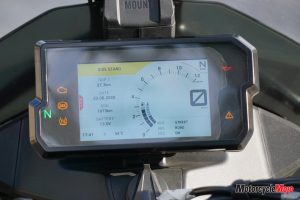 The 790 Adventure models both boast the 799 cc LC8c engine platform, a versatile, high-performance and compact weapon also used on KTM’s 790 Duke and Duke R. The engine on both Adventure models creates 95 hp and 65 ft-lb of torque. This peppy engine will rip out of any corner and gives a sporty feel to the machines.
The 790 Adventure models both boast the 799 cc LC8c engine platform, a versatile, high-performance and compact weapon also used on KTM’s 790 Duke and Duke R. The engine on both Adventure models creates 95 hp and 65 ft-lb of torque. This peppy engine will rip out of any corner and gives a sporty feel to the machines.
The Ténéré 700 uses the CP2 engine platform, the same as you’ll find on the MT-07, which produces 72.4 hp and 50 ft-lb of reliable, smooth torque. This engine won’t rip your arms out of their sockets but it does offer more than adequate power to tackle any terrain and is suitable for all skill levels.
Yamaha knows it hit the mark untouched in the adventure industry by offering a capable midsize machine at the lowest price point in the segment right now, at $12,399. Although the T7 lacks some performance features, most riders coming from a dirt bike background or any rider tired of all other adventure machines will find the Ténéré 700 incredibly appealing; it also begs to be customized and fitted to the preferences of the rider.
The T7’s attractive rally-style body inspires the rider yet the engine doesn’t intimidate, and while the bike handles competently off-road, the suspension and brakes feel lacking at times. In saying this, compared to other midsize competitors and without KTM’s 790 models in the way, the T7 would beat all others in its class in off-road performance.
The 790 Adventure offers a higher-end, versatile package, at $13,499. With a lower seat height and plenty of power, this machine mixes just enough high-performance adventure with a feasible price. This is another machine that you could easily customize to be your own and, with its shorter seat height, this bike offers a great platform for all “compact” riders.
The 790 Adventure R offers a more serious adventure-based platform for those who are looking to buy into a bike without the need to do modifications before their first serious off-road ride. I think that many riders who buy this bike are unlikely to use it to its full potential but will appreciate the ability in which it can perform. And at $14,599, the R still costs less than most midsize adventure machines.
Now, you may ask, which has won – the rabbit or the hare(s)? The answer: all three models are winners and will take you through their natural habitat with ease.
In the end, the winner is the bike that leads you to adventure – and all three of these bikes have the ability to do just that.







